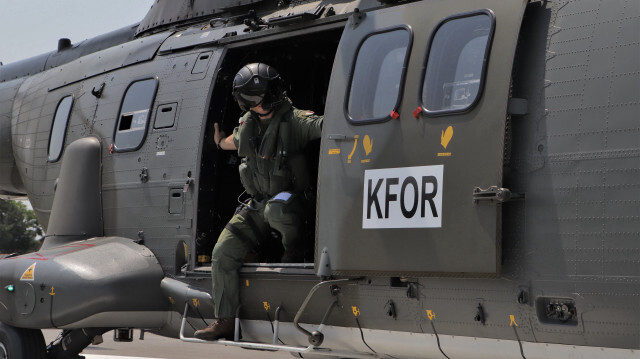

File Photo
If Serbian president orders it, army is ready to fulfill its obligations to protect Serbs in neighboring Kosovo, says Chief of General Staff Milan Mojsilovic
Serbia’s military chief on Friday called on NATO's Kosovo Force (KFOR) and other international security institutions to provide “urgent” protection to ethnic Serbs living in neighboring Kosovo.
"I informed the KFOR commander that we are following events with great anxiety and demand that urgent measures be taken to protect the Serbian people and the right of Serbs to survive,” Milan Mojsilovic, Serbia’s chief of General Staff, told a press conference in the capital Belgrade over the tension in northern Kosovo, which borders Serbia.
“This is our plea to the entire KFOR and other international security institutions in Kosovo," he added.
Mojsilovic claimed that Kosovo Serbs are facing the "terrible terror regime" of Kosovo Prime Minister Albin Kurti and are being exiled from their homeland.
After Albanians, Serbs are Kosovo’s biggest ethnic group, especially in the country’s north, next to Serbia. Serbia has never recognized the 2008 independence of Kosovo.
The election of ethnic Albanian mayors this April, amid a Serb boycott, led to tension in the north. Troops from neighboring Serbia also amassed at the border.
"The Serbian army fulfills the requirements of international law and agreements. It is obvious that international institutions do not fulfill them. The army is ready to fulfill the orders that will be given,'' said Mojsilovic.
He added that if the armed forces get an order from President Aleksandar Vucic, it will fulfill all its obligations under relevant UN Security Council resolutions.
- EU says new elections needed
The European Union urged Kosovo on Thursday to suspend police operations in the northern Serb-dominated municipalities and announce new snap local elections.
The move came after a meeting in Brussels between Vucic and Kurti to find a solution to the current tensions between their countries as part of EU-facilitated talks.
Together with Miroslav Lajcak, the EU special envoy for the Belgrade-Pristina dialogue, EU foreign policy chief Josep Borrell met the parties in separate meetings.
After the April elections in northern Kosovo, the EU said that the low turnout among local Serbs did not provide municipalities with long-term political solutions.
Ethnic Serbs have been protesting the election of the mayors since late May.
On May 30, NATO decided to deploy 700 more troops to KFOR, the alliance-led peacekeeping mission in Kosovo, after 30 of its soldiers were injured amid unrest. A contingent of Turkish troops was among the reinforcements.
- Tensions on border
Tensions were sparked following Kosovo’s detention of one of the organizers of a May 29 attack on NATO's peacekeeping force, which was deployed amid Serb unrest over the installation of the ethnic Albanian mayors.
Serbia detained three Kosovo police officers last week, saying they were "planning an action in Serbia." But Kosovo claimed that its officers had been kidnapped.
The EU requires Kosovo and Serbia to reach a final agreement and resolve disputes between them to progress in their integration with the bloc.
Most UN member states – including the US, UK, France, Germany and Türkiye – recognized Kosovo as a country separate from its neighbor when Pristina declared independence 15 years ago, but Belgrade continues to regard it as its territory.
#Serbia Kosovo
#KFOR
#UN Security Council
